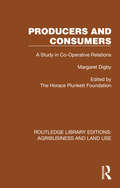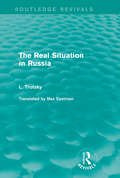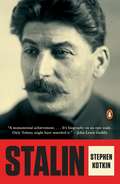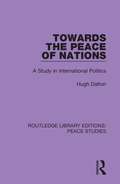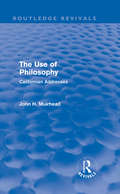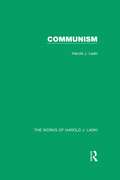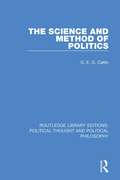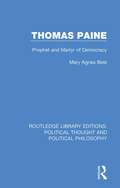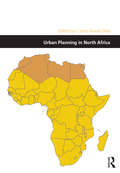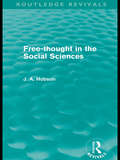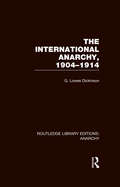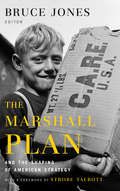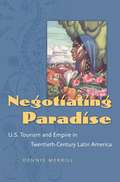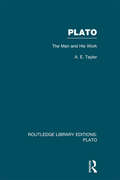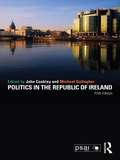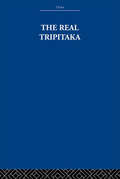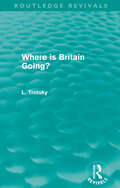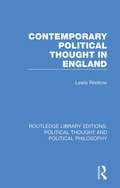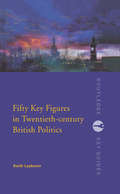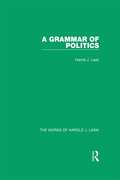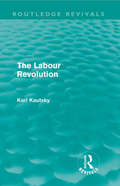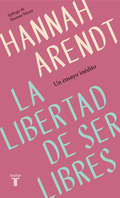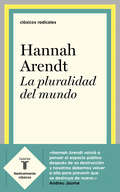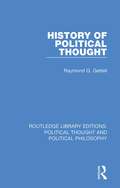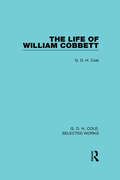- Table View
- List View
Producers and Consumers: A Study in Co-Operative Relations (Routledge Library Editions: Agribusiness and Land Use #6)
by Margaret DigbyAlthough originally published in 1928, many of the issues discussed in this book remain pertinent today: in unstable markets grappling with labour shortages, how to pay the producers of food a fair price, at a price the consumer can afford, whilst maximising efficiency and minimising waste. Against this backdrop, the book discusses co-operative movements from the UK, Denmark, New Zealand, the former USSR and the USA.
The Real Situation in Russia (Routledge Revivals Ser.)
by Leon TrotskyThe Real Situation in Russia, first published in 1928, contains three of Trotsky’s harshest rebuttals of Stalin’s takeover of the Russian Revolution following the death of Lenin. The first part contains a defence of the ‘Opposition Platform’ against the Stalinist denunciation; the second details Trotsky’s view of the precise nature of the Stalinist program, as well as its disastrous consequences for Russia; and the third demonstrates the unashamed falsification of the history by Stalin with regard to the beginning of the Revolution. Including a sympathetic, but nonetheless astute, introduction to Trotsky’s argument by the translator, The Real Situation in Russia will prove to be of value to all students of twentieth-century Marxism, and in particular to those interested in the Russian Revolution – not only its origins and early development, but also, perhaps, the reasons for its ultimate failure.
Stalin: Paradoxes of Power, 1878-1928
by Stephen KotkinA magnificent new biography that revolutionizes our understanding of Stalin and his worldIt has the quality of myth: a poor cobbler's son, a seminarian from an oppressed outer province of the Russian empire, reinvents himself as a top leader in a band of revolutionary zealots. When the band seizes control of the country in the aftermath of total world war, the former seminarian ruthlessly dominates the new regime until he stands as absolute ruler of a vast and terrible state apparatus, with dominion over Eurasia. While still building his power base within the Bolshevik dictatorship, he embarks upon the greatest gamble of his political life and the largest program of social reengineering ever attempted: the collectivization of all agriculture and industry across one sixth of the earth. Millions will die, and many more millions will suffer, but the man will push through to the end against all resistance and doubts.Where did such power come from? In Stalin, Stephen Kotkin offers a biography that, at long last, is equal to this shrewd, sociopathic, charismatic dictator in all his dimensions. The character of Stalin emerges as both astute and blinkered, cynical and true believing, people oriented and vicious, canny enough to see through people but prone to nonsensical beliefs. We see a man inclined to despotism who could be utterly charming, a pragmatic ideologue, a leader who obsessed over slights yet was a precocious geostrategic thinker--unique among Bolsheviks--and yet who made egregious strategic blunders. Through it all, we see Stalin's unflinching persistence, his sheer force of will--perhaps the ultimate key to understanding his indelible mark on history.Stalin gives an intimate view of the Bolshevik regime's inner geography of power, bringing to the fore fresh materials from Soviet military intelligence and the secret police. Kotkin rejects the inherited wisdom about Stalin's psychological makeup, showing us instead how Stalin's near paranoia was fundamentally political, and closely tracks the Bolshevik revolution's structural paranoia, the predicament of a Communist regime in an overwhelmingly capitalist world, surrounded and penetrated by enemies. At the same time, Kotkin demonstrates the impossibility of understanding Stalin's momentous decisions outside of the context of the tragic history of imperial Russia.The product of a decade of intrepid research, Stalin is a landmark achievement, a work that recasts the way we think about the Soviet Union, revolution, dictatorship, the twentieth century, and indeed the art of history itself.
Towards the Peace of Nations: A Study in International Politics (Routledge Library Editions: Peace Studies)
by Hugh DaltonHugh Dalton was a British Labour Party economist and politician, who served as Chancellor of the Exchequer from 1945 to 1947 under Clement Atlee. After surviving the First World War, he was drawn in to active politics with the belief that, rightly handled, it could put an end to war. This title, originally published in 1928, is based on his journeys of political observation in Europe, where he examined the new conditions created by the war and subsequent events. He outlines some central problems and some provisional solutions.
The Use of Philosophy: Californian Addresses (Routledge Revivals)
by John H MuirheadFirst published in 1928, this book reproduces the lectures and addresses that John Henry Muirhead gave on various occasions during the two and a half years he spent as Lecturer of Philosophy on the Mills Foundation at the University of California, USA. The different chapters look at the meaning and general place of Philosophy as a subject of study and the application of its leading conceptions to different areas of modern life, including science and politics. The final chapters however, present two short talks of a different nature, which were addressed to Scottish countrymen, gathered on foreign shores. This book outlines Muirhead's philosophical thoughts and conclusions to which he devoted his life.
Communism (The Works of Harold J. Laski)
by Harold J. LaskiThis volume bases a clear and unbiased account of Communist philosophy on the Marxian Materialist Concept of History and Marxian Theory of Value. The spear-head of Marxism is its doctrine of class-struggle and from this Laski sets out on in his exposition of the Communist attitude. Although first published in 1927, the intervening years have in no way detracted from the intrinsic value of this enlightening study, regarded by many as the essential textbook for the understanding of this subject.
The Science and Method of Politics (Routledge Library Editions: Political Thought and Political Philosophy #12)
by G. E. CatlinOriginally published in 1927, this book was written as a reaction to the First World War, hoping to try and analyse the causes leading up to it. The author states in the Preface that he puts this forward as an unsystematic contribution to what he is conscious is a very great subject, and he adds since Aristotle, an almost untouched one. He starts by looking at the nature, methods and uses of history, considered from a political point of view. He goes on to look at the possibility of a political science; the place of politics among the social sciences, and the process of politics. In conclusion he considers the relation of politics and ethics.
Thomas Paine: Prophet and Martyr of Democracy (Routledge Library Editions: Political Thought and Political Philosophy #8)
by Mary Agnes BestFirst published in 1927. This study explores Thomas Paine, an English-born American philosopher, activist, political theorist and revolutionary. The author examines Paine’s important aspects of Paine’s life, including his migration to the British Colonies, his participation in the American Revolution, and his imprisonment in Paris. This title will be of great interest to historians and those studying philosophy and politics.
Urban Planning in North Africa (Design and the Built Environment)
by Carlos Nunes SilvaThere has been relatively little written on the history of urban planning in North Africa, despite the wealth of towns and cities in this region which date back to Antiquity. The book explores the history of urban planning in North Africa and the challenges confronting contemporary urban planning in Algeria, Egypt, Libya, Morocco, and Tunisia. It examines the transnational flow of planning ideas during the colonial period, namely through the French, British, and Italian colonial presence, and the Portuguese and Spanish influences as well, and discusses key challenges currently confronting urban planning in the major urban centers in the region. The fifteen chapters that constitute the book offer an informed analysis of the history of urban planning in North Africa, covering the pre-colonial, colonial and post-colonial periods.
Free-Thought in the Social Sciences (Routledge Revivals)
by J. A. HobsonThis Routledge Revival sees the reissue of a seminal work by British economist, sociologist and academic John A. Hobson, elucidating his views on a variety of topics across the social sciences. He makes particular reference to the struggle between the disinterested urge of the social scientist and the interests and other motive forces which tend to influence and mould his processes of inquiry. The work is split into three parts, focussing upon free-thinking, economics and political ethics respectively.
The International Anarchy (Routledge Library Editions: Anarchy)
by G. Lowes DickinsonThis volume, a classic of its time, discusses the tragic evolution of European politics from 1870-1914. The main part of the book describes the development of the relations between France, Germany, Russia and Britain and follows the sequence of political events, the Triple Alliance and Bismarck's secret treaties, the Triple Entente, Morocco and the Conference of Algeciras, The Annexation of Bosnia, Agadir, Tripoli, the Bagdad Railway, Persia, the Far East, the Balkan Wars. Its value remains because while other books deal with the actions of individuals, this volume indicates the underlying forces of which they were the victims.
The Marshall Plan and the Shaping of American Strategy
by Bruce D. Jones Strobe Talbott Will MorelandHow the United States helped restore a Europe battered by World War II and created the foundation for the postwar international orderSeventy years ago, in the wake of World War II, the United States did something almost unprecedented in world history: It launched and paid for an economic aid plan to restore a continent reeling from war. The European Recovery Plan-better known as the Marshall Plan, after chief advocate Secretary of State George C. Marshall-was in part an act of charity but primarily an act of self-interest, intended to prevent postwar Western Europe from succumbing to communism. By speeding the recovery of Europe and establishing the basis for NATO and diplomatic alliances that endure to this day, it became one of the most successful U.S. government programs ever.The Brookings Institution played an important role in the adoption of the Marshall Plan. At the request of Arthur Vandenberg, chairman of the Senate Foreign Relations Committee, Brookings scholars analyzed the plan, including the specifics of how it could be implemented. Their report gave Vandenberg the information he needed to shepherd the plan through a Republican-dominated Congress in a presidential election year.In his foreword to this book, Brookings president Strobe Talbott reviews the global context in which the Truman administration pushed the Marshall Plan through Congress, as well as Brookings' role in that process. The book includes Marshall's landmark speech at Harvard University in June 1947 laying out the rationale for the European aid program, the full text of the report from Brookings analyzing the plan, and the lecture Marshall gave upon receiving the Nobel Peace Prize in 1953. The book concludes with an essay by Bruce Jones and Will Moreland that demonstrates how the Marshall Plan helped shape the entire postwar era and how today's leaders can learn from the plan's challenges and successes.
Negotiating Paradise
by Dennis MerrillAccounts of U.S. empire building in Latin America typically portray politically and economically powerful North Americans descending on their southerly neighbors to engage in lopsided negotiations. Dennis Merrill's comparative history of U.S. tourism in Latin America in the twentieth century demonstrates that empire is a more textured, variable, and interactive system of inequality and resistance than commonly assumed. In his examination of interwar Mexico, early Cold War Cuba, and Puerto Rico during the Alliance for Progress, Merrill demonstrates how tourists and the international travel industry facilitated the expansion of U.S. consumer and cultural power in Latin America. He also shows the many ways in which local service workers, labor unions, business interests, and host governments vied to manage the Yankee invasion. While national leaders negotiated treaties and military occupations, visitors and hosts navigated interracial encounters in bars and brothels, confronted clashing notions of gender and sexuality at beachside resorts, and negotiated national identities. Highlighting the everyday realities of U.S. empire in ways often overlooked, Merrill's analysis provides historical context for understanding the contemporary debate over the costs and benefits of globalization.
Plato: The Man And His Work (Routledge Library Editions: Plato)
by A.E. TaylorThis book provides an introduction to Plato’s work that gives a clear statement of what Plato has to say about the problems of thought and life. In particular, it tells the reader just what Plato says, and makes no attempt to force a system on the Platonic text or to trim Plato’s works to suit contemporary philosophical tastes. The author also gives an account that has historical fidelity - we cannot really understand the Republic or the Gorgias if we forget that the Athens of the conversations is meant to be the Athens of Nicias or Cleon, not the very different Athens of Plato’s own manhood. To understand Plato’s thought we must see it in the right historical perspective.
Politics in the Republic of Ireland
by Michael Gallagher John CoakleyPolitics in the Republic of Ireland is now available in a fully revised fifth edition. Building on the success of the previous four editions, it continues to provide an authoritative introduction to all aspects of politics in the Republic of Ireland. Written by some of the foremost experts on Irish politics, it explains, analyzes and interprets the background to Irish government and contemporary political processes. Bringing students up to date with the very latest developments, Coakley and Gallagher combine real substance with a highly readable style, providing an accessible textbook that meets the needs of all those who are interested in knowing how politics and government operate in Ireland.
The Real Tripitaka: And Other Pieces
by The Arthur Estate Arthur WaleyFirst published in 1952. The Real Tripitaka gives an account of the seventh century pilgrim's adventures, spiritual and material, both in India and after his return to China. In addition the book contains an account of a Japanese pilgrim's visit to China in the ninth century, which describes the Wu-t'ai Shan, China's great place of Pilgrimage, and an eye-witness's account of the great persecution of Buddhism in 842-845 A.D.
Where is Britain Going? (Routledge Revivals)
by Leon TrotskyFirst Published in 1926, Where is Britain Going? focuses on the historical factors and circumstances which were to define Britain’s development in the midst of social unrest at that time. The book considers the future of Britain in an age when the working classes were being driven into confrontation with the state under the impact of the world crisis of capitalism. Writing over eighty years ago, Trotsky concentrates on the decline of British imperialism in his analysis of the Bolshevik Revolution. In a brilliant polemic that exposes all the treachery of the Labour leaders in the year before the General strike, he recalls the revolutionary traditions of the working class and draws on the historical lessons of the English Civil War and Chartism. Rejecting the parliamentary road and stripping bare the pretensions of Fabian socialism, Where is Britain going? outlines perspectives of revolution which continue to retain their validity.
Contemporary Political Thought in England (Routledge Library Editions: Political Thought and Political Philosophy #50)
by Lewis RockowFirst published in 1925. This book is a brief analysis of the historical relation of contemporary writers to their immediate predecessors. The author attempts to further a comprehensive summary of certain selected writers, with a criticism of their ideas, while in the last chapter an attempt is made at synthesis. Among those whose work is examined are Ramsay MacDonald, Bertrand Russell, Harold Laski, the Pauls, Hobhouse, Bryce, G. D. H. Cole, Norman Angell, etc. This title will be of great interest to students of politics, philosophy and history.
Fifty Key Figures in Twentieth Century British Politics (Routledge Key Guides)
by Keith LaybornThis guidebook provides a complete overview of the lives and influence of fifty major figures in modern British political history. Reflecting the changes within British society and politics over the past century, the entries chart the development of key contemporary issues such as women's rights, immigration and the emergence of New Labour. Figures covered include:* Winston Churchill* Tony Blair* Emmeline Pankhurst* David Lloyd George* Margaret Thatcher* John Maynard Keynes* Enoch Powell* Barbara CastleWith cross-referenced entries and helpful suggestions for further reading, this book is an essential guide for all those with an interest in understanding the dominating issues of modern British politics.
A Grammar of Politics (The Works of Harold J. Laski)
by Harold J. LaskiLaski’s magnum opus, this volume outlines the history and functions of state institutions which (in the author’s view) are desirable for the effective functioning of a democracy. Topics discussed include: The necessity of government; state and society; rights and power; liberty and equality; property as a theory of industrial organisation; the nature of nationalism; law as a source of authority; the functions of international organisations.
The Labour Revolution (Routledge Revivals)
by Karl KautskyFirst published in English in 1924 this ambitious work, by the famous Marxist theoretician Karl Kautsky, aims to provide nothing less than an "exposition of the methods to introduce socialism" amongst the capitalist economies of Europe in the post-World War One era. Looking back on the experiences of the German socialist movement and looking forwards to the likelihood of a Labour government in Great Britain, he discusses the problems facing a labour revolution in Europe, with particular reference to the role of the middle classes, the transitional period between capitalism and socialism, and the economic impact of a socialist revolution.
La libertad de ser libres
by Hannah Arendt«Leer a Hannah Arendt permite comprender mejor el presente.» Berliner Morgenpost ¿Qué es la libertad y qué significa para nosotros? ¿Consiste solo en la ausencia de miedo y restricciones, o acaso implica también la participación en procesos sociales, con voz política propia, ser escuchado, reconocido y finalmente recordado por otros? Publicado en Estados Unidos en los años sesenta pero inédito hasta hoy en español -y en alemán-, este ensayo refleja el rigor y la fuerza del pensamiento político de Hannah Arendt y condensa con precisión y maestría sus reflexiones sobre la libertad, de gran calado y capaces de conectar de manera asombrosa con los desafíos y peligros de nuestro tiempo. Arendt rastrea el desarrollo histórico de la noción de libertad, en particular, toma en cuenta las revoluciones en Francia y América. Mientras que la primera supuso un punto de inflexión en la historia pero terminó en desastre, la otra fue un éxito triunfal pero se mantuvo como un asunto local. Repensar la idea de revolución se ha vuelto imperioso hoy, y este reencuentro con Hannah Arendt representa el impulso necesario para las nuevas generaciones. La crítica ha dicho:«Este ensayo recién redescubierto es como una petición de compromiso político en la era de Trump.»Die Zeit «Pese a haber sido escrito hace cincuenta años, es tan moderno que parece pensado para la actualidad política mundial.»Westdeutscher Rundfunk «Breve y revelador. Escrito hace más de cincuenta años, es de una vigencia pasmosa.»Deutschlandfunk Kultur «Una pieza muy atractiva y perdida por largo tiempo.»Süddeutsche Zeitung «Este texto tiene futuro hoy.»Frankfurter Rundschau «Un texto muy sugerente, que además es perfecto para los recién llegados a Arendt.»Zeitzeichen «Un ensayo inspirador de una relevancia extraordinaria, especialmente en tiempos en que se cuestionan los valores liberales del orden democrático.»Philosophie «Lo que parece un análisis preciso de la fallida construcción de la nación por medios militares, desde Somalia hasta Irak y Afganistán, en realidad tiene cinco décadas de antigüedad.»Westdeutsche Allgemeine Zeitung «Vale la pena leerlo por la claridad de su razonamiento, por ejemplo a la hora de fijar el concepto de "revolución" y reflejar su cambio histórico de significado.»Badische Neueste Nachrichten
La pluralidad del mundo
by Hannah ArendtLa obra de Hannah Arendt sintetizada en esta antología esencial e imprescindible. No hay nada más radical que un clásico. Hannah Arendt, la gran pensadora del siglo XX, es sin duda fundamental para afrontar los desafíos del XXI. Abordó todas las cuestiones clave de su tiempo, desde el antisemitismo hasta el totalitarismo, los orígenes de la democracia, la crisis de la autoridad, los fundamentos de la educación y la estética o el problema del mal en la modernidad. Toda su obra está sintetizada en esta antología esencial e imprescindible. ------------- radical: adj. Perteneciente o relativo a la raíz. «Clásicos Radicales» nace con la misión de recuperar algunos de los libros más emblemáticos del sello que en su día formularon una idea nueva u ofrecieron una mirada original y pertinente sobre las grandes cuestiones universales.Ausentes de las librerías durante demasiado tiempo pero recordados y buscados por los lectores más despiertos, estos textos esenciales de disciplinas como la filosofía, la ética, la historia, la sociología, la economía, la antropología, la psicología y la política mantienen su plena vigencia y vuelven hoy con fuerza para iluminar nuestro presente. ------------- Reseña:«Hannah Arendt volvió a pensar el espacio público después de su destrucción y nosotros debemos volver a ella para prevenir que se destruya de nuevo.»Andreu Jaume
History of Political Thought (Routledge Library Editions: Political Thought and Political Philosophy #25)
by Raymond G. GettellFirst published in 1924. This extensive volume explores the history of political theory from Ancient Greece up until proletarian thought in the early twentieth century. The author pays particular attention to the connection between economic and political theory during the eighteenth and nineteenth centuries. History of Political Thought will be of great interest to students of history, politics, and philosophy.
The Life of William Cobbett (Routledge Library Editions)
by G D ColeThis volume is representative of the historical works of a particular period (1923-29) when there was a hiatus in the output of Cole the theoretician. It is an extraordinary contribution to labour history and is among the finest of his historical works.
